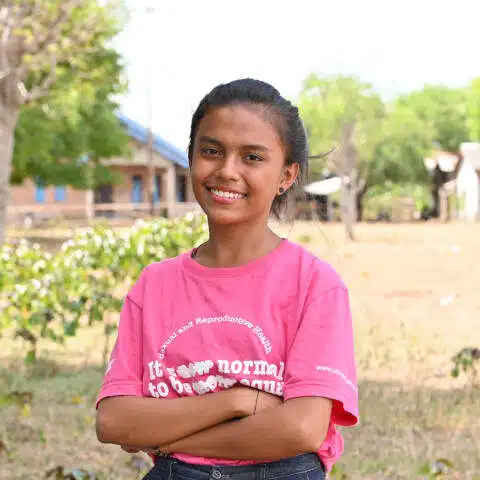Stand with girls
around the world
to end child marriage.
Child marriage denies girls the freedom to make their own decisions, be in charge of their bodies, and to have choices and opportunities for their futures.
Every girl deserves the right to choose who, when – and if – she wants to marry.
Early and child marriage violates girls’ human rights and robs them of their childhood. Girls who are married before they turn 18 are more likely to experience domestic violence and are less likely to stay in school. And they are often forced to have children before they’re physically and emotionally ready.
Child marriage isn’t isolated to one culture, religion or group of people. It cuts across countries, cultures, religions and backgrounds. The root causes – which allow it to continue – are gender inequality, poverty, cultural norms and a lack of education.
We have the power to change this.
If every girl completed secondary education, there would be 60% fewer pregnancies in girls under the age of 17 in sub-Saharan Africa. And 12 years of education for every girls would reduce child marriage worldwide by 64%!
Education is one of the strongest and surest ways to end child marriage. By making sure every girl has the opportunity to go to – and complete – school, we are creating a world where girls have choices and opportunities to shape their own futures.
That’s why Plan International is working with girls in communities where child marriage occurs to make sure they know their rights. We’re supporting families to understand the risks of child marriage and to make sure girls’ voices are heard and valued. We also advocate to governments and policy-makers to ensure child marriage is outlawed, to help shift attitudes at a national level.
Stand with girls to end child marriage
Stand with incredible girls and young women like Chanda

Chanda
“I will try my best to study to a high level and become a doctor,” says 16-year-old Chanda when asked what she wants to do in the future. More than anything though, Chanda hopes that, by focusing on education, she will not be caught up in child marriage, as many of her friends have experienced, in East Nusa Tenggara (NTT), Indonesia’s southernmost province.
Chanda formed her life plan after joining the Choosing the Future (MAPAN) project, which was implemented in her community by Plan International. The project prepares girls and young people for their future, encouraging them to stay in school and avoid early marriages.
“I was taught how to be assertive, how to save money, how babies are created, and much more. I have also become more confident when speaking in public,” says Chanda who is a first-year senior high student. “The knowledge and skills I have developed have also really helped me to excel in school. In my class, I am now the top student.”
Why does child marriage happen?
- Lack of education: girls with no education are more likely to be married before the age of 18 than those with a secondary education.
- Gender inequality: girls and women often occupy a lower status as a result of social and cultural traditions, attitudes and beliefs that deny them their rights.
- Poverty: in families on a low income, girls may be seen as an economic burden. The perception that a girl’s potential to earn an income is comparatively poor pushes girls out of their homes and into marriage.
- Customs: in many countries, the importance of preserving family ‘honour’ and girls’ virginity means parents push their daughters into marriage before they’re ready. People believe marriage safeguards against ‘immoral’ or ‘inappropriate’ behaviour.
- Failure to enforce laws: sometimes families aren’t aware they’re breaking the law. In some countries early marriage is so prevalent, prosecutions are seldom brought.
- Conflicts, disasters and emergencies: disasters and emergencies increase economic pressures on households and many families who wouldn’t previously have considered early marriage turn to it as a last resort.
Stand with girls to end child marriage
About Plan International Australia
Put simply, we’re the charity for girls’ equality.
We tackle the root causes of poverty, support communities through crisis, campaign for gender equality, and help governments do what’s right for children and particularly for girls.
We are here to ignite the creativity, talent and ideas of girls in all their diversities. We are informed by evidence, and always learning.
A better now for her. A better future for everyone.
This is what we stand for. Will you join us?


